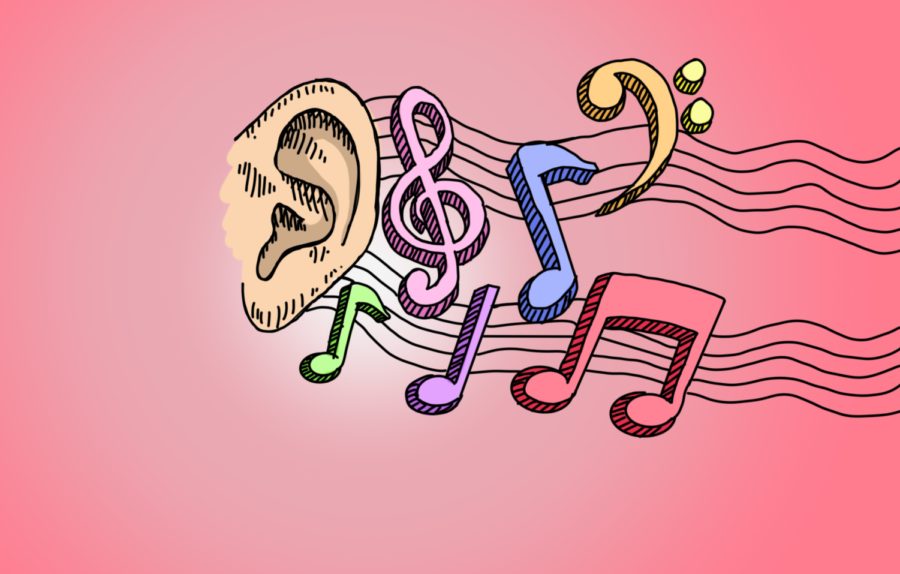The Wires Behind the Music
November 2, 2022
When the word ‘music’ is mentioned, our minds immediately go to this idea of creativity, or a form of art to be specific. It remains the metaphorical paintbrush of the Creative Arts, friendships are made because of the same taste in music and a song can be someone’s life story.
Yet so much depth lies underneath the surface of a mixture of sounds; I mean, has it ever occurred to you that music may have a strong neurological connection to science?
We blindly listen to music whether it’s on the way to school or in class while doing work. We are attracted to the catchy tunes of a song and our brain follows.
We all get that one song stuck in our heads at one point in our lives. In fact, according to experts, 98% of us get addicted to a song multiple times in our lifetime, known scientifically as an ‘earworm’. Don’t worry, earworms aren’t creepy crawlies living inside your head; it’s just the name for a catchy tune that runs continually through a person’s mind. Scientists believe that earworms occur due to the brain’s attempt to fill a gap in the auditory cortex located in the temporal lobe. When you listen to a song on repeat, the brain transmits that sound information to a short-term memory system in the auditory cortex known as a “phonological loop”.
Lead researcher David Kraemer in the study, Your Brain on Music, says, “We found that the auditory cortex is active when you’re actually listening to a song and reactivated when you just imagine hearing the song”- almost as if the auditory cortex acts as your imagination’s MP3 player! In addition to this discovery, researchers found that when it comes to music, people’s memory for music is incredible; even compared to remembering people’s names. In fact, the songs we listened to when we were children, such as “Twinkle, Twinkle Little Star”, or the “Hokey Pokey” probably helped us learn the difference between our lefts and rights. People will still remember the melody, beat, and words of these songs, years after they last heard them. So maybe, after all, earworms aren’t the annoying tune that we can’t get rid of but were beneficial to us after all without us knowing! I am sure after we graduate from William Clarke College, we would still be able to sing the College Song years later after singing along to it at every Assembly…
Bringing me to my next point; if earworms are caused by listening to repeated songs, what is it about a song that makes us want to listen to it on repeat?
Even though earworms are triggered by listening to a song repeatedly, it can be also caused by listening to a song during a period of stress or a song that subconsciously connects to past events or memories. Believe it or not, studies showed this year that, despite sociocultural differences, worldwide, personality traits have a significant correlation to an individual’s respective preference in music genres.
According to Psychologist Kelly Jakubowski, the songs that tend to be popular in our heads are based on the song’s melodic content. Number one songs have a few things in common; a moderately fast tempo, along with a distinctive melodic shape – and unusual intervals, just like in the chorus of Lady Gaga’s hit song in 2009, “Bad Romance”.
Although there is no definitive formula that differentiates between a hit song and the majority of all other songs, popular music always has fresh and original lyrics, distinctive melodic (and repetitive) rhythms in vocals, and creative elements in production and instrumentation. They soon become the catchy tunes that establish a ‘craze’ – setting the new trend for other musicians – essentially following the common elements with a twist. As Dr. Kelly Jakubowski, a researcher in music psychology, denotes in her deconstruction of the science of earworms, “the song “Uptown funk” by Bruno Mars and Mark Ronson in 2014, had to be quite simple in order to be recalled spontaneously, but also have something a bit unique that makes the brain want to rehearse it over and over again”.
So, has the music industry been manipulating our ears to be attracted to only certain songs and get earworms stuck in our heads through science? Or could it just simply be the repeat of a song on the radio, a relative cause of an earworm as well? Earworms are so common that 91% of people get an earworm once each week, revealing how engrossed our society is in music, it’s as if we can’t live without it. On the way to school, working out, and even just studying, our earplugs are in listening to that nostalgic playlist. Is it of our own doings that these earworms are in our heads?













